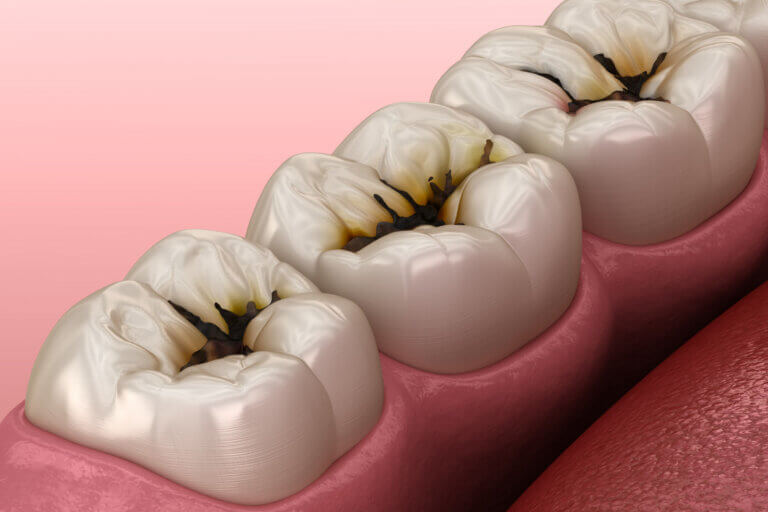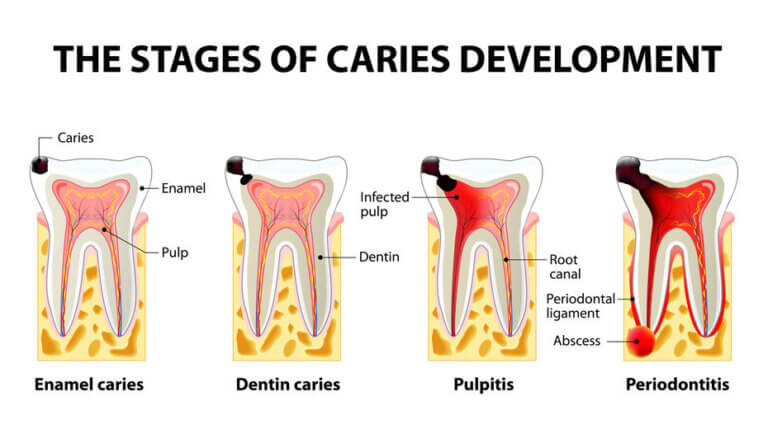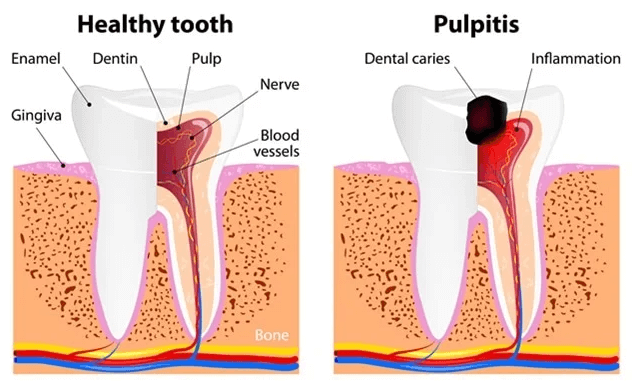Irreversible Pulpitis

What Is Irreversible Pulpitis?
If you’ve ever experienced a sudden, sharp, and persistent toothache, you may be experiencing “Irreversible Pulpitis.” This dental condition, though it might sound intimidating, is a common issue that affects millions of people every year. Irreversible pulpitis is a dental ailment resulting from untreated cavities, tooth trauma, or extensive dental work, causing severe and persistent tooth pain. Symptoms of irreversible pulpitis include persistent, throbbing tooth pain, extreme sensitivity to hot or cold stimuli, swelling in the gums or face, and potential pus drainage. Unlike reversible pulpitis, which can be treated and reversed to preserve the tooth’s health, irreversible pulpitis will lead to a persistent and intense toothache that does not subside and requires more aggressive dental intervention, such as root canal therapy or tooth extraction to alleviate the discomfort and prevent further complications.
Before you contact a Toronto dentist to examine Irreversible Pulpitis, there are some things you should know as a patient:
- Why Do I Have Irreversible Pulpitis?
- Signs And Symptoms Of Irreversible Pulpitis
- Treatment Options For Irreversible Pulpitis
- Managing Irreversible Pulpitis Until You Can See The Dentist
If you have questions about Irreversible Pulpitis or other dental problems, please contact us for more information.
Why Do I Have Irreversible Pulpitis?
There are several reasons why someone might develop irreversible pulpitis:
- Untreated Cavities (Caries): Irreversible pulpitis often develops when dental cavities, if left untreated, progress deep into the dentin, the layer beneath the tooth’s protective enamel.
- Extensive Dental Procedures: Teeth that have undergone multiple invasive dental treatments such as large dental fillings, dental crowns, or dental bridges may become more susceptible to irreversible pulpitis. This is because repeated procedures can compromise the tooth’s vitality and trigger inflammation in the dental pulp.
- Dental Trauma: Accidents or injuries that disrupt the lymphatic and blood supply to the dental pulp can be a significant contributor to irreversible pulpitis. Trauma can damage the tooth’s inner structure, leading to inflammation and persistent pain.
If you suspect you have irreversible pulpitis or are experiencing dental pain, it’s crucial to seek prompt dental care. A dentist will assess your condition and recommend an appropriate treatment plan, which may include root canal therapy or tooth extraction to alleviate the pain and prevent further complications. For more information about Irreversible Pulpitis, please contact us.

Signs And Symptoms Of Irreversible Pulpitis
Recognizing the signs and symptoms of irreversible pulpitis is crucial for timely intervention and relief from dental pain. Here’s what to look out for:
- Spontaneous Toothache: Irreversible pulpitis often manifests as spontaneous and intense tooth pain, which may occur without any apparent cause.
- Prolonged Pain: Unlike reversible pulpitis, the discomfort associated with irreversible pulpitis lingers for an extended duration, particularly after exposure to heat and, less frequently, cold.
- Difficulty Locating Pain: Patients may experience difficulty pinpointing the precise tooth causing the pain, sometimes even confusing the affected area between the upper and lower dental arches, although not between the left and right sides of the mouth.
- Temporary Relief: In some cases, the pain may temporarily cease for several days due to the pulp becoming necrotic, but it often returns with increased intensity.
- Sensitivity to Pressure: As the infection progresses and extends through the tooth’s apical foramen, the affected tooth becomes highly sensitive to pressure and percussion.
- Tooth Elevation: In severe cases, a periapical abscess may develop, causing the tooth to feel elevated or “high” when the patient bites down.
If you suspect you have irreversible pulpitis or are experiencing dental pain, it’s crucial to seek prompt dental care. A dentist will assess your condition and recommend an appropriate treatment plan, which may include root canal therapy or tooth extraction to alleviate the pain and prevent further complications. For more information about Irreversible Pulpitis, please contact us.
Treatment Options For Irreversible Pulpitis
When you have irreversible pulpitis, the treatment options typically aim to alleviate your pain, remove the damaged pulp, and save the tooth if possible. The primary treatment options for irreversible pulpitis are:
- Root Canal Therapy: Root canal treatment is a common and highly effective procedure to manage irreversible pulpitis. It involves removing the infected pulp, thoroughly cleaning the root canals, shaping them, and then filling them with a material called gutta-percha. This not only relieves pain but also preserves the tooth’s structure. Afterwards you will require a dental filling to patch the hole and a dental crown to reinforce the tooth.
- Tooth Extraction: In cases where the tooth is severely damaged or when root canal therapy is not a viable option, extraction becomes necessary. While losing a tooth is not ideal, it may be the only solution to prevent further complications. Tooth replacement options include a dental implant, dental bridge, or denture.
- Antibiotics: In situations where dental infection cannot be resolved with local measures, dentists may prescribe antibiotics to manage the spread of bacteria. This is especially important if patients exhibit systemic signs of infection, such as fever.
The choice between these treatment options depends on various factors, including the extent of damage, the location of the affected tooth, your overall oral health, and your personal preferences. Your dentist will discuss the pros and cons of each option with you and help you make an informed decision. For more information about Irreversible Pulpitis, please contact us.

Managing Irreversible Pulpitis Until You Can See The Dentist
Experiencing the pain of irreversible pulpitis can be distressing, but there are steps you can take to manage the discomfort until you can receive professional dental care. Here are some strategies to help alleviate the pain:
- Use Over-the-Counter Pain Medication: Over-the-counter pain medication can help relieve tooth pain from irreversible pulpitis. You are also welcome to use over the counter pain relievers such as ibuprofen (Advil) or acetaminophen (Tylenol). Ask your dentist what dosage is right for you, but if you do not have a pre-existing medical condition of allergies, 1000mg acetaminophen (Tylenol) with 600mg ibuprofen (Advil) every 4-6 hours or as needed is a very powerful combination.
- Cold Compress: Applying a cold compress to the outside of your cheek can help reduce inflammation and numb the affected area, providing some relief.
- Avoid Trigger Foods: Stay away from hot, cold, or sugary foods that can exacerbate the pain. Opt for softer, lukewarm options to minimize discomfort.
- Elevate Your Head: Keeping your head elevated while sleeping can reduce blood flow to the affected tooth and ease pain.
- Rinse With Saltwater: Rinsing your mouth with warm saltwater can help reduce inflammation and kill bacteria. Mix a teaspoon of salt in a cup of warm water and swish the solution around your mouth for about 30 seconds before spitting it out. Alternatively, you can buy and use any mouthwash available at your pharmacy or health foods store
- Practice Good Oral Hygiene: Keeping the area around your affected tooth clean as possible can help prevent further damage and alleviate some of the tooth pain. Brush and floss gently around the tooth. Use a soft-bristled toothbrush to minimize further irritation of the affected tooth.
While these strategies may offer temporary respite, they are not long-term solutions. It’s essential to schedule an appointment with a dentist as soon as possible for proper diagnosis and treatment to address the root cause of irreversible pulpitis. For more information about Irreversible Pulpitis, please contact us.

